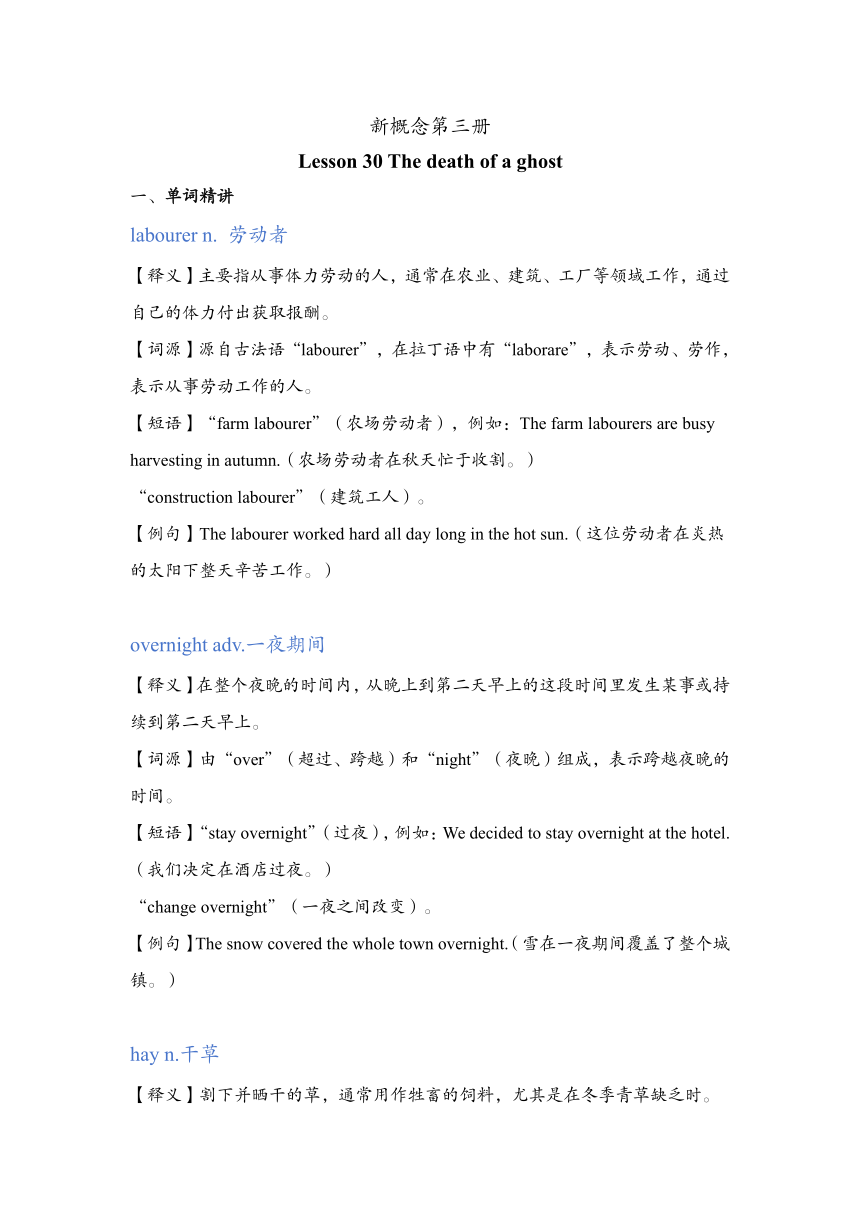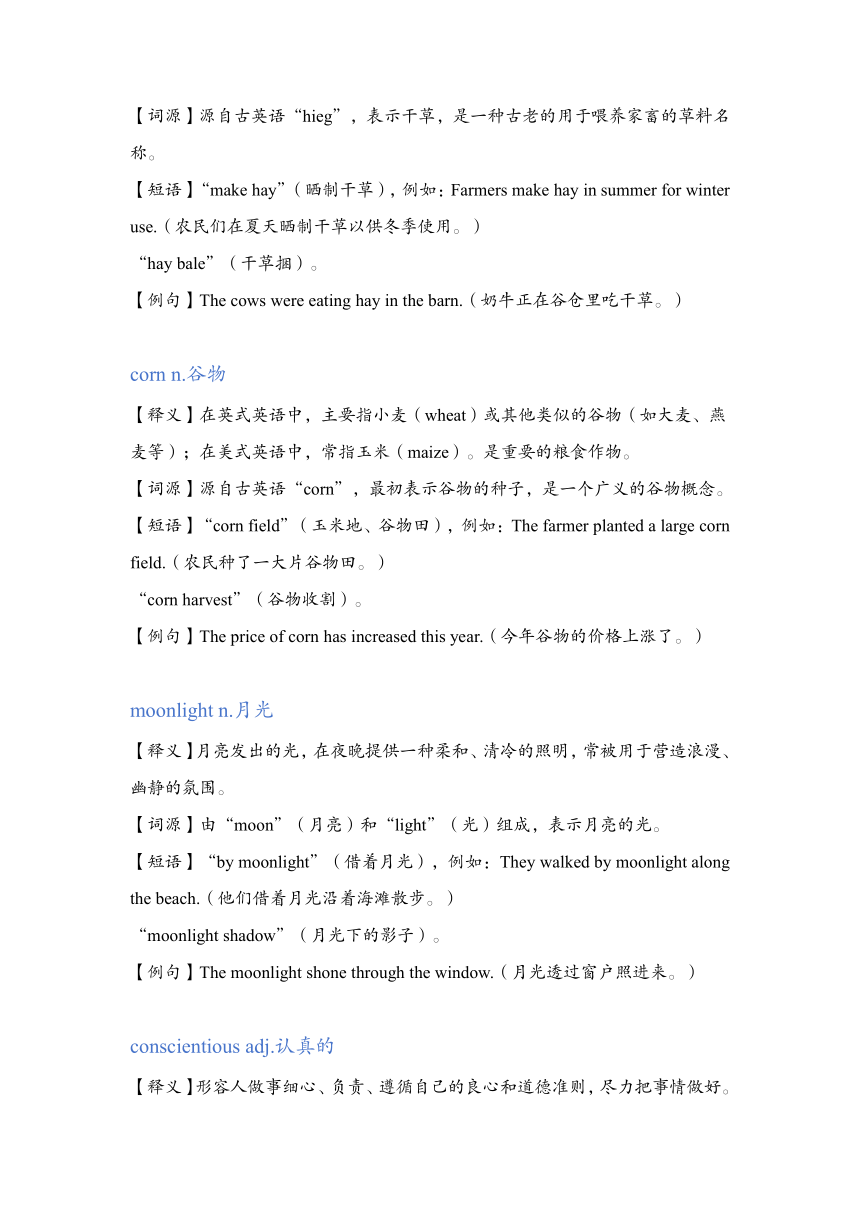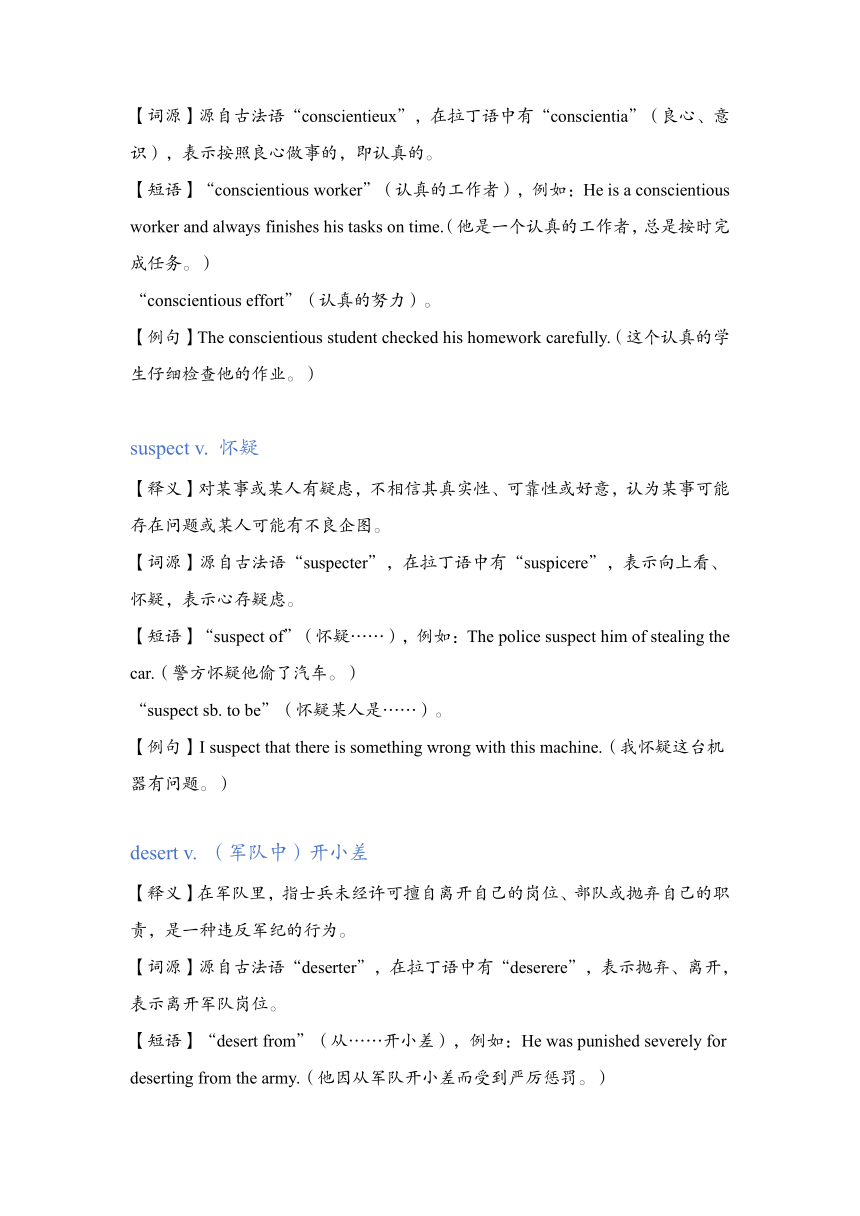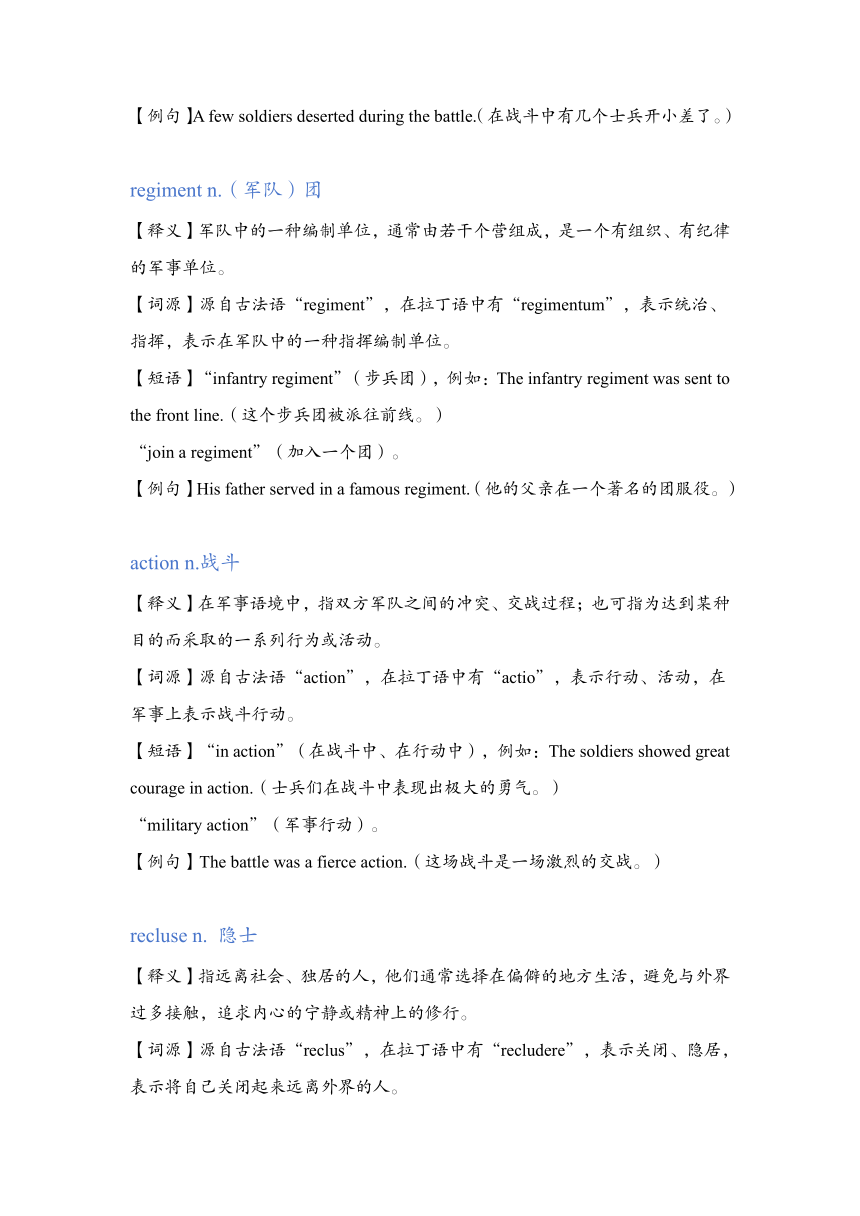新概念第三册 Lesson 30 The death of a ghost 讲义
文档属性
| 名称 | 新概念第三册 Lesson 30 The death of a ghost 讲义 |  | |
| 格式 | docx | ||
| 文件大小 | 315.2KB | ||
| 资源类型 | 教案 | ||
| 版本资源 | 新概念英语 | ||
| 科目 | 英语 | ||
| 更新时间 | 2024-12-04 17:22:14 | ||
图片预览




文档简介
新概念第三册
Lesson 30 The death of a ghost
单词精讲
labourer n. 劳动者
【释义】主要指从事体力劳动的人,通常在农业、建筑、工厂等领域工作,通过自己的体力付出获取报酬。
【词源】源自古法语“labourer”,在拉丁语中有“laborare”,表示劳动、劳作,表示从事劳动工作的人。
【短语】“farm labourer”(农场劳动者),例如:The farm labourers are busy harvesting in autumn.(农场劳动者在秋天忙于收割。)
“construction labourer”(建筑工人)。
【例句】The labourer worked hard all day long in the hot sun.(这位劳动者在炎热的太阳下整天辛苦工作。)
overnight adv.一夜期间
【释义】在整个夜晚的时间内,从晚上到第二天早上的这段时间里发生某事或持续到第二天早上。
【词源】由“over”(超过、跨越)和“night”(夜晚)组成,表示跨越夜晚的时间。
【短语】“stay overnight”(过夜),例如:We decided to stay overnight at the hotel.(我们决定在酒店过夜。)
“change overnight”(一夜之间改变)。
【例句】The snow covered the whole town overnight.(雪在一夜期间覆盖了整个城镇。)
hay n.干草
【释义】割下并晒干的草,通常用作牲畜的饲料,尤其是在冬季青草缺乏时。
【词源】源自古英语“hieg”,表示干草,是一种古老的用于喂养家畜的草料名称。
【短语】“make hay”(晒制干草),例如:Farmers make hay in summer for winter use.(农民们在夏天晒制干草以供冬季使用。)
“hay bale”(干草捆)。
【例句】The cows were eating hay in the barn.(奶牛正在谷仓里吃干草。)
corn n.谷物
【释义】在英式英语中,主要指小麦(wheat)或其他类似的谷物(如大麦、燕麦等);在美式英语中,常指玉米(maize)。是重要的粮食作物。
【词源】源自古英语“corn”,最初表示谷物的种子,是一个广义的谷物概念。
【短语】“corn field”(玉米地、谷物田),例如:The farmer planted a large corn field.(农民种了一大片谷物田。)
“corn harvest”(谷物收割)。
【例句】The price of corn has increased this year.(今年谷物的价格上涨了。)
moonlight n.月光
【释义】月亮发出的光,在夜晚提供一种柔和、清冷的照明,常被用于营造浪漫、幽静的氛围。
【词源】由“moon”(月亮)和“light”(光)组成,表示月亮的光。
【短语】“by moonlight”(借着月光),例如:They walked by moonlight along the beach.(他们借着月光沿着海滩散步。)
“moonlight shadow”(月光下的影子)。
【例句】The moonlight shone through the window.(月光透过窗户照进来。)
conscientious adj.认真的
【释义】形容人做事细心、负责、遵循自己的良心和道德准则,尽力把事情做好。
【词源】源自古法语“conscientieux”,在拉丁语中有“conscientia”(良心、意识),表示按照良心做事的,即认真的。
【短语】“conscientious worker”(认真的工作者),例如:He is a conscientious worker and always finishes his tasks on time.(他是一个认真的工作者,总是按时完成任务。)
“conscientious effort”(认真的努力)。
【例句】The conscientious student checked his homework carefully.(这个认真的学生仔细检查他的作业。)
suspect v. 怀疑
【释义】对某事或某人有疑虑,不相信其真实性、可靠性或好意,认为某事可能存在问题或某人可能有不良企图。
【词源】源自古法语“suspecter”,在拉丁语中有“suspicere”,表示向上看、怀疑,表示心存疑虑。
【短语】“suspect of”(怀疑……),例如:The police suspect him of stealing the car.(警方怀疑他偷了汽车。)
“suspect sb. to be”(怀疑某人是……)。
【例句】I suspect that there is something wrong with this machine.(我怀疑这台机器有问题。)
desert v. (军队中)开小差
【释义】在军队里,指士兵未经许可擅自离开自己的岗位、部队或抛弃自己的职责,是一种违反军纪的行为。
【词源】源自古法语“deserter”,在拉丁语中有“deserere”,表示抛弃、离开,表示离开军队岗位。
【短语】“desert from”(从……开小差),例如:He was punished severely for deserting from the army.(他因从军队开小差而受到严厉惩罚。)
【例句】A few soldiers deserted during the battle.(在战斗中有几个士兵开小差了。)
regiment n.(军队)团
【释义】军队中的一种编制单位,通常由若干个营组成,是一个有组织、有纪律的军事单位。
【词源】源自古法语“regiment”,在拉丁语中有“regimentum”,表示统治、指挥,表示在军队中的一种指挥编制单位。
【短语】“infantry regiment”(步兵团),例如:The infantry regiment was sent to the front line.(这个步兵团被派往前线。)
“join a regiment”(加入一个团)。
【例句】His father served in a famous regiment.(他的父亲在一个著名的团服役。)
action n.战斗
【释义】在军事语境中,指双方军队之间的冲突、交战过程;也可指为达到某种目的而采取的一系列行为或活动。
【词源】源自古法语“action”,在拉丁语中有“actio”,表示行动、活动,在军事上表示战斗行动。
【短语】“in action”(在战斗中、在行动中),例如:The soldiers showed great courage in action.(士兵们在战斗中表现出极大的勇气。)
“military action”(军事行动)。
【例句】The battle was a fierce action.(这场战斗是一场激烈的交战。)
recluse n. 隐士
【释义】指远离社会、独居的人,他们通常选择在偏僻的地方生活,避免与外界过多接触,追求内心的宁静或精神上的修行。
【词源】源自古法语“reclus”,在拉丁语中有“recludere”,表示关闭、隐居,表示将自己关闭起来远离外界的人。
【短语】“a hermit - like recluse”(像隐士般的隐士),例如:The old man lived as a hermit - like recluse in the mountains.(这位老人像隐士般在山中独居。)
【例句】The recluse rarely had visitors.(这位隐士很少有访客。)
二、课文精讲
1.For years, villagers believed that Endley Farm was haunted.多年来,村民们一直认为恩得利农场在闹鬼。
时间状语for years放在句首,强调这个农场“闹鬼"许多年了。
2.The farm was owned by two brothers,Joe and Bob Cox.恩得利农场属于乔考科斯和鲍勃考科斯兄弟俩所有。
Joe and Bob Cox是two brothers的同位语,起解释说明的作用。
3.They employed a few farmhands, but no one was willing to work there long.他们雇了几个农工,但谁也不愿意在那儿长期工作下去。
but作转折连词时,后半句一点是对前半句内容的转折或否定。
4.Every time a worker gave up his job, he told the same story.每次雇工辞职后都叙述着同样的故事。
every time在句首,引导时间状语从句。
5.Farm labourers said that they always woke up to find that work had been done overnight.雇工们说,常常一早起来发现有人在夜里把活干了。
that引导宾语从句,交代said的内容。The work had been done overnight是省去了引导词that的宾语从句,作find的宾语。
6.Hay had been cut and cowsheds had been cleaned.干草已切好,牛棚也打扫干净了。
had been cut和had been cleaned均为过去完成时的被动语态,强调在过去的过去事情已经做完了。
7.A farm worker,who stayed up all night, claimed to have seen a figure cutting corn in the moonlight.有一个彻夜未眠的雇工还声称他看见一个人影在月光下收割庄稼。
who引导一个非限制性定语从句,对这个farm worker作进一步的补充修饰。
8. In time, it became an accepted fact that the Cox brothers employed a conscientious ghost that did most of their workfor them.随着时间的流逝,考科斯兄弟雇了一个尽心尽责的鬼,他们家的活大部分都让鬼给干了,这件事成了公认的事实。
第一个that引导同位语从句,对fact进行充分的解释说明,即"事实是什么”。
第二个that引导定语从句,修饰ghost,说明这个ghost做了什么。
9.No one suspected that there might be someone else on the farm who had never been seen.谁也没想到农场竟会有一个从未露面的人。
:that引导宾语从句,交代suspected的内容。
10.This was indeed the case.但事实上确有此人。
这个句子为承上启下的过渡句。
11.A short time ago, villagers were astonished to learn that the ghost of Endley had died.不久之前,村民们惊悉恩得利农场的鬼死了。
:that引导宾语从句,交代learn的内容。
12.Everyone went to the funeral, for the 'ghost was none other than Eric Cox, a third brother who was supposed to havedied as a young man.大家都去参加了葬礼,因为那“鬼""不是别人,正是农场主的兄弟埃里克.考科斯。人们以为埃里克年轻时就死了。
none other than表示·正是”,起强调作用。
Who引导定语从句,修饰a third brother,说明这第三个弟兄是谁。
13.After the funeral, Joe and Bob revealed a secret which they had kept for over fifty years.葬礼之后,乔和鲍勃透露了他们保守了长达50多年的秘密。
which引导定语从句,说明是“何种秘密"。
14.Eric had been the eldest son of the family, very much older than his two brothers.埃里克是这家长子。年龄比他两个弟弟大很多。
very much older than his two brothers在句中充当比较状语。
15.He had been obliged to join the army during the Second World War.第二次世界大战期间被迫参军。
during the Second World War作时间状语,交代"在什么时候"。
16.As he hated army life, he decided to desert his regiment.他讨厌军旅生活,决定逃离所在部队。
as引导原因状语从句,说明从部队“逃跑"的原因。
17.When he learnt that he would be sent abroad, he returned to the farm and his father hid him until the end of the war.当他了解自己将被派遣出国时,他逃回农场,父亲把他藏了起来,直到战争结束。
when引导时间状语从句。That引导宾语从句,交代learnt的内容。
18.Fearing the authorities,Eric remained in hiding after the war as well.由于害怕当局,埃里克战后继续深藏不露。
现在分词短语fearing the authorities作原因状语。
19. His father told everybody that Eric had been killed in action.他的父亲告诉大家,埃里克在战争中被打死了。
that引导宾语从句,交代told的内容。
20.The only other people who knew the secret were Joe and Bob.除此之外,只有乔与鲍知道这个秘密。
only的意思不是说"只有一个人",而表示“仅仅"。
Who引导定语从句,修饰the only otherpeople。
21.They did not even tell their wives.但他俩连自己的妻子都没告诉。
副词even起强调作用。
Lesson 30 The death of a ghost
单词精讲
labourer n. 劳动者
【释义】主要指从事体力劳动的人,通常在农业、建筑、工厂等领域工作,通过自己的体力付出获取报酬。
【词源】源自古法语“labourer”,在拉丁语中有“laborare”,表示劳动、劳作,表示从事劳动工作的人。
【短语】“farm labourer”(农场劳动者),例如:The farm labourers are busy harvesting in autumn.(农场劳动者在秋天忙于收割。)
“construction labourer”(建筑工人)。
【例句】The labourer worked hard all day long in the hot sun.(这位劳动者在炎热的太阳下整天辛苦工作。)
overnight adv.一夜期间
【释义】在整个夜晚的时间内,从晚上到第二天早上的这段时间里发生某事或持续到第二天早上。
【词源】由“over”(超过、跨越)和“night”(夜晚)组成,表示跨越夜晚的时间。
【短语】“stay overnight”(过夜),例如:We decided to stay overnight at the hotel.(我们决定在酒店过夜。)
“change overnight”(一夜之间改变)。
【例句】The snow covered the whole town overnight.(雪在一夜期间覆盖了整个城镇。)
hay n.干草
【释义】割下并晒干的草,通常用作牲畜的饲料,尤其是在冬季青草缺乏时。
【词源】源自古英语“hieg”,表示干草,是一种古老的用于喂养家畜的草料名称。
【短语】“make hay”(晒制干草),例如:Farmers make hay in summer for winter use.(农民们在夏天晒制干草以供冬季使用。)
“hay bale”(干草捆)。
【例句】The cows were eating hay in the barn.(奶牛正在谷仓里吃干草。)
corn n.谷物
【释义】在英式英语中,主要指小麦(wheat)或其他类似的谷物(如大麦、燕麦等);在美式英语中,常指玉米(maize)。是重要的粮食作物。
【词源】源自古英语“corn”,最初表示谷物的种子,是一个广义的谷物概念。
【短语】“corn field”(玉米地、谷物田),例如:The farmer planted a large corn field.(农民种了一大片谷物田。)
“corn harvest”(谷物收割)。
【例句】The price of corn has increased this year.(今年谷物的价格上涨了。)
moonlight n.月光
【释义】月亮发出的光,在夜晚提供一种柔和、清冷的照明,常被用于营造浪漫、幽静的氛围。
【词源】由“moon”(月亮)和“light”(光)组成,表示月亮的光。
【短语】“by moonlight”(借着月光),例如:They walked by moonlight along the beach.(他们借着月光沿着海滩散步。)
“moonlight shadow”(月光下的影子)。
【例句】The moonlight shone through the window.(月光透过窗户照进来。)
conscientious adj.认真的
【释义】形容人做事细心、负责、遵循自己的良心和道德准则,尽力把事情做好。
【词源】源自古法语“conscientieux”,在拉丁语中有“conscientia”(良心、意识),表示按照良心做事的,即认真的。
【短语】“conscientious worker”(认真的工作者),例如:He is a conscientious worker and always finishes his tasks on time.(他是一个认真的工作者,总是按时完成任务。)
“conscientious effort”(认真的努力)。
【例句】The conscientious student checked his homework carefully.(这个认真的学生仔细检查他的作业。)
suspect v. 怀疑
【释义】对某事或某人有疑虑,不相信其真实性、可靠性或好意,认为某事可能存在问题或某人可能有不良企图。
【词源】源自古法语“suspecter”,在拉丁语中有“suspicere”,表示向上看、怀疑,表示心存疑虑。
【短语】“suspect of”(怀疑……),例如:The police suspect him of stealing the car.(警方怀疑他偷了汽车。)
“suspect sb. to be”(怀疑某人是……)。
【例句】I suspect that there is something wrong with this machine.(我怀疑这台机器有问题。)
desert v. (军队中)开小差
【释义】在军队里,指士兵未经许可擅自离开自己的岗位、部队或抛弃自己的职责,是一种违反军纪的行为。
【词源】源自古法语“deserter”,在拉丁语中有“deserere”,表示抛弃、离开,表示离开军队岗位。
【短语】“desert from”(从……开小差),例如:He was punished severely for deserting from the army.(他因从军队开小差而受到严厉惩罚。)
【例句】A few soldiers deserted during the battle.(在战斗中有几个士兵开小差了。)
regiment n.(军队)团
【释义】军队中的一种编制单位,通常由若干个营组成,是一个有组织、有纪律的军事单位。
【词源】源自古法语“regiment”,在拉丁语中有“regimentum”,表示统治、指挥,表示在军队中的一种指挥编制单位。
【短语】“infantry regiment”(步兵团),例如:The infantry regiment was sent to the front line.(这个步兵团被派往前线。)
“join a regiment”(加入一个团)。
【例句】His father served in a famous regiment.(他的父亲在一个著名的团服役。)
action n.战斗
【释义】在军事语境中,指双方军队之间的冲突、交战过程;也可指为达到某种目的而采取的一系列行为或活动。
【词源】源自古法语“action”,在拉丁语中有“actio”,表示行动、活动,在军事上表示战斗行动。
【短语】“in action”(在战斗中、在行动中),例如:The soldiers showed great courage in action.(士兵们在战斗中表现出极大的勇气。)
“military action”(军事行动)。
【例句】The battle was a fierce action.(这场战斗是一场激烈的交战。)
recluse n. 隐士
【释义】指远离社会、独居的人,他们通常选择在偏僻的地方生活,避免与外界过多接触,追求内心的宁静或精神上的修行。
【词源】源自古法语“reclus”,在拉丁语中有“recludere”,表示关闭、隐居,表示将自己关闭起来远离外界的人。
【短语】“a hermit - like recluse”(像隐士般的隐士),例如:The old man lived as a hermit - like recluse in the mountains.(这位老人像隐士般在山中独居。)
【例句】The recluse rarely had visitors.(这位隐士很少有访客。)
二、课文精讲
1.For years, villagers believed that Endley Farm was haunted.多年来,村民们一直认为恩得利农场在闹鬼。
时间状语for years放在句首,强调这个农场“闹鬼"许多年了。
2.The farm was owned by two brothers,Joe and Bob Cox.恩得利农场属于乔考科斯和鲍勃考科斯兄弟俩所有。
Joe and Bob Cox是two brothers的同位语,起解释说明的作用。
3.They employed a few farmhands, but no one was willing to work there long.他们雇了几个农工,但谁也不愿意在那儿长期工作下去。
but作转折连词时,后半句一点是对前半句内容的转折或否定。
4.Every time a worker gave up his job, he told the same story.每次雇工辞职后都叙述着同样的故事。
every time在句首,引导时间状语从句。
5.Farm labourers said that they always woke up to find that work had been done overnight.雇工们说,常常一早起来发现有人在夜里把活干了。
that引导宾语从句,交代said的内容。The work had been done overnight是省去了引导词that的宾语从句,作find的宾语。
6.Hay had been cut and cowsheds had been cleaned.干草已切好,牛棚也打扫干净了。
had been cut和had been cleaned均为过去完成时的被动语态,强调在过去的过去事情已经做完了。
7.A farm worker,who stayed up all night, claimed to have seen a figure cutting corn in the moonlight.有一个彻夜未眠的雇工还声称他看见一个人影在月光下收割庄稼。
who引导一个非限制性定语从句,对这个farm worker作进一步的补充修饰。
8. In time, it became an accepted fact that the Cox brothers employed a conscientious ghost that did most of their workfor them.随着时间的流逝,考科斯兄弟雇了一个尽心尽责的鬼,他们家的活大部分都让鬼给干了,这件事成了公认的事实。
第一个that引导同位语从句,对fact进行充分的解释说明,即"事实是什么”。
第二个that引导定语从句,修饰ghost,说明这个ghost做了什么。
9.No one suspected that there might be someone else on the farm who had never been seen.谁也没想到农场竟会有一个从未露面的人。
:that引导宾语从句,交代suspected的内容。
10.This was indeed the case.但事实上确有此人。
这个句子为承上启下的过渡句。
11.A short time ago, villagers were astonished to learn that the ghost of Endley had died.不久之前,村民们惊悉恩得利农场的鬼死了。
:that引导宾语从句,交代learn的内容。
12.Everyone went to the funeral, for the 'ghost was none other than Eric Cox, a third brother who was supposed to havedied as a young man.大家都去参加了葬礼,因为那“鬼""不是别人,正是农场主的兄弟埃里克.考科斯。人们以为埃里克年轻时就死了。
none other than表示·正是”,起强调作用。
Who引导定语从句,修饰a third brother,说明这第三个弟兄是谁。
13.After the funeral, Joe and Bob revealed a secret which they had kept for over fifty years.葬礼之后,乔和鲍勃透露了他们保守了长达50多年的秘密。
which引导定语从句,说明是“何种秘密"。
14.Eric had been the eldest son of the family, very much older than his two brothers.埃里克是这家长子。年龄比他两个弟弟大很多。
very much older than his two brothers在句中充当比较状语。
15.He had been obliged to join the army during the Second World War.第二次世界大战期间被迫参军。
during the Second World War作时间状语,交代"在什么时候"。
16.As he hated army life, he decided to desert his regiment.他讨厌军旅生活,决定逃离所在部队。
as引导原因状语从句,说明从部队“逃跑"的原因。
17.When he learnt that he would be sent abroad, he returned to the farm and his father hid him until the end of the war.当他了解自己将被派遣出国时,他逃回农场,父亲把他藏了起来,直到战争结束。
when引导时间状语从句。That引导宾语从句,交代learnt的内容。
18.Fearing the authorities,Eric remained in hiding after the war as well.由于害怕当局,埃里克战后继续深藏不露。
现在分词短语fearing the authorities作原因状语。
19. His father told everybody that Eric had been killed in action.他的父亲告诉大家,埃里克在战争中被打死了。
that引导宾语从句,交代told的内容。
20.The only other people who knew the secret were Joe and Bob.除此之外,只有乔与鲍知道这个秘密。
only的意思不是说"只有一个人",而表示“仅仅"。
Who引导定语从句,修饰the only otherpeople。
21.They did not even tell their wives.但他俩连自己的妻子都没告诉。
副词even起强调作用。
同课章节目录
